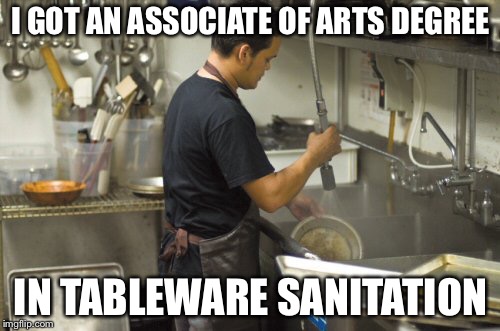

- 25 WITH A WORTHLESS DEGREE AND STUCK IN A DEAD END JOB HOW TO
- 25 WITH A WORTHLESS DEGREE AND STUCK IN A DEAD END JOB PROFESSIONAL
You realize that the corporate culture is to bring in outside talent when high-level positions open up, instead of promoting from within, Reynolds says. You don’t feel like an important part of your team. You’re not an asset to your team or department. Whatever the matter, if it is known that there is a mismatch, and both of you are uncomfortable, your career isn’t likely to move forward at that company. “Maybe there are cultural differences clashes in environmental aspects of its operations civic responsibility or work ethic issues, et cetera,” Taylor says. Your values and the firm’s values are not aligned. “If you’ve tried reinventing yourself at the company, modifying your job description or proposed a lateral move to no avail, then it’s time to look elsewhere,” Taylor says.

“There’s no challenge, no opportunity that excites you at the workplace.”Īttempts to change or improve your job are not welcomed. “No enthusiasm to get up and go to work is a sign you’re in a dead-end job,” Khare adds. “What you used to enjoy doing is no longer enjoyable,” Shindler says. You get that Monday morning feeling nearly every day. “While some people may enjoy working on the same tasks, a tell-tale sign of a dead-end job is employees who are not being offered advancement or new training,” Nicolai says. You have been doing the same work for more than one or two years without a promotion, increase in pay, or increased responsibility. “Essentially, you are being ignored out of a job e-mails go unanswered and you’re lucky if you catch your boss in the restroom,” Taylor says. Your projects seem to get lost in the abyss. You can’t get time with the boss to move projects forward. Your voice is no longer heard and your opinions are no longer valued, Shindler adds. Your thoughts and contributions are not valued. You feel unchallenged by your job, your boss, or your co-workers with no welcome avenue to change things, Reynolds says. You notice your colleagues are getting opportunities you don’t get, says David Shindler, author of Learning to Leap and founder of social learning site, The Employability Hub.

You are asked about your goals and plans, but the boss pays no attention to them or doesn’t support you in reaching them, Khare says.
25 WITH A WORTHLESS DEGREE AND STUCK IN A DEAD END JOB PROFESSIONAL
You are not being asked about your professional goals or future plans, says Tina Nicolai, an executive career coach and résumé writer. They’re not interested in your career goals. You may have been passed over for promotion – or your requests to take on more challenging projects have been ignored. “Your supervisor doesn’t tap into your skills set or go beyond what you’ve been contributing for quite some time,” Taylor says. “If your position feels static and you don’t see a way to earn further responsibilities or get ahead even after offering ideas on the subject, you’re probably in a dead-end job,” Reynolds adds. “This is perhaps what you’d be doing five years from now, and your career goals do not align with what you currently do,” Khare says. Your work offers no change in routine it’s very mechanical. Here are 20 tell-tale signs that you’re stuck in a dead-end job: “It’s vitally important for each of us to know and assess the difference.” The latter is not about the job or the company it’s about us,” says Joyce K. “The former we need to assess with regard to the company we work for and the job potential itself. After hitting enough walls, however, you realize that those efforts and energy could be better placed toward a new job search.”īut before you throw in the towel, you need to determine whether you’re actually in a dead-end job, or you simply don’t like what you’re doing. The realization rarely happens overnight because oftentimes the employee has offered to take on more challenging assignments, but that falls on deaf ears.
25 WITH A WORTHLESS DEGREE AND STUCK IN A DEAD END JOB HOW TO
Almost everyone experiences this at some point in their career, says Lynn Taylor, a national workplace expert and author of Tame Your Terrible Office Tyrant How to Manage Childish Boss Behavior and Thrive in Your Job. “It is often difficult at first to discern if you’re in a stagnant position.


 0 kommentar(er)
0 kommentar(er)
